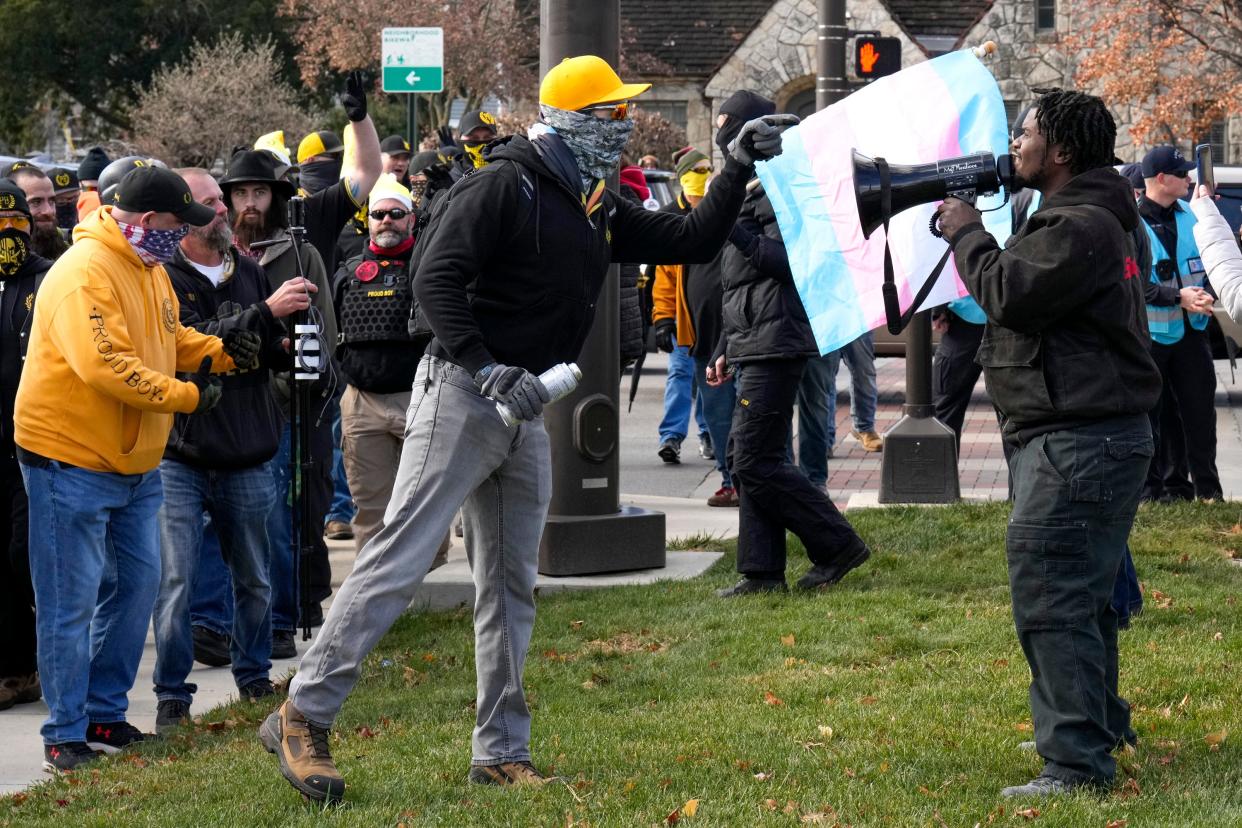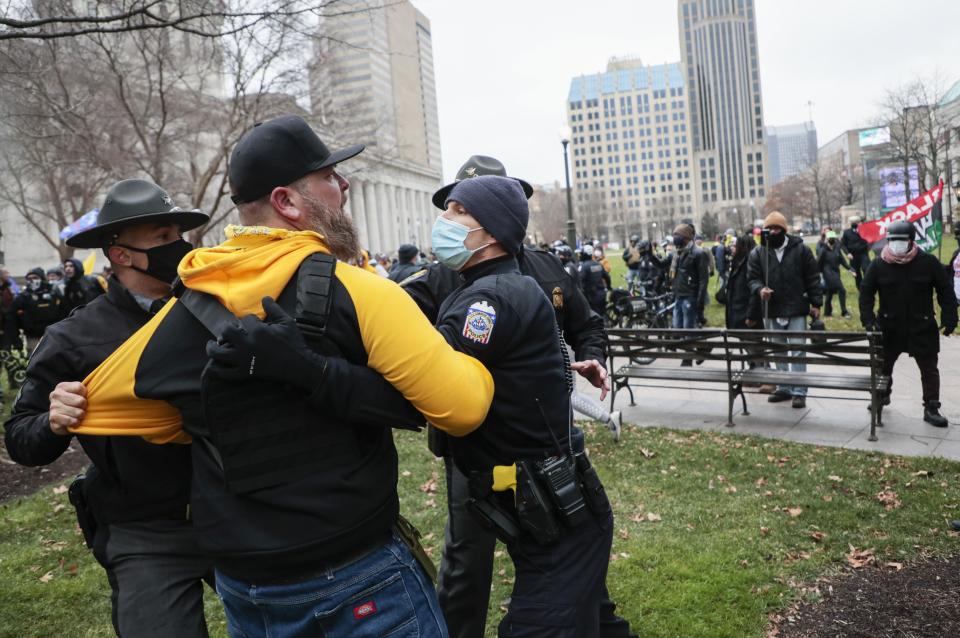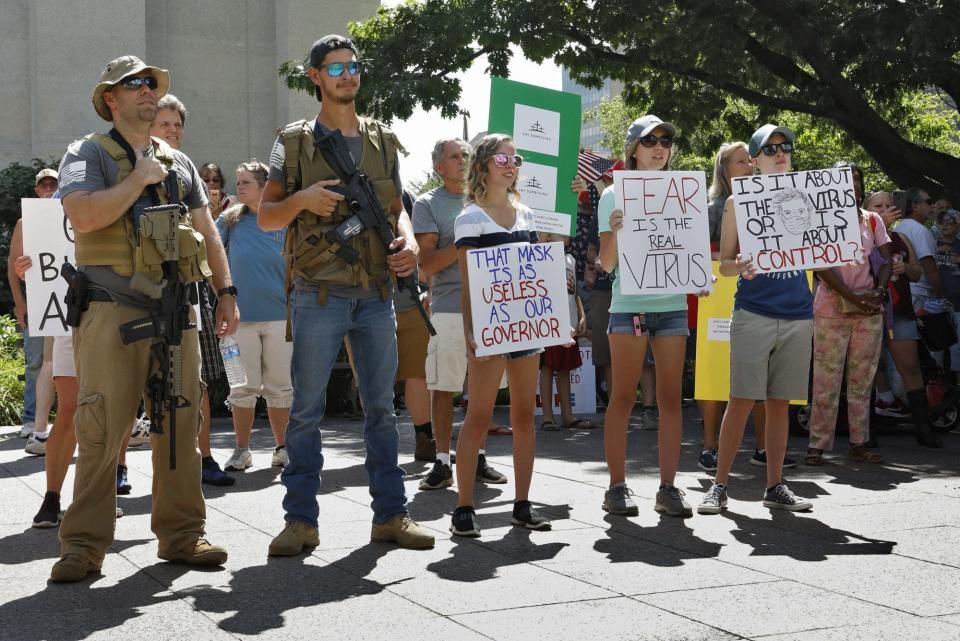Is Ohio a top state for hate groups? Here's what we know about them

The state that dubs itself the "Heart of it All" appears to also be a hotbed for hate groups and anti-government organizations.
Ohio is home to at least 55 such groups, according to tracking by the nonprofit Southern Poverty Law Center (SPLC). Ohio's 55 recognized hate groups mean the state ranks fifth in the nation behind California, which is first with 103, Florida with 89, and Texas and Pennsylvania, which each have 72 groups located there.
"Ohio is a hotbed of activity," said Jeff Tischauser, senior research analyst at the SPLC. "Ohio is right there with Tennessee and Florida and is one of the front lines where groups are going out into the public and intimidating and harassing folks."
Read More: Licking County official, Ohio law enforcement officers on Oath Keepers membership lists
The SPLC is considered one of the most recognized organizations tracking hate and anti-government groups in the United States. But some have also criticized the law center for designating organizations as extremist for what they've argued are political viewpoints.
The SPLC defines a hate group as an organization that has beliefs or practices that attack or malign an entire class of people. The designation is determined based on a group's activities or statements and includes organizations only known to be active through things such as marches, rallies, speeches, flyers, publishing or criminal acts, according to the law center.

Investigations into violent extremism nationwide have been on the rise in recent years, FBI Director Christopher Wray told Congress in September 2021. Between 2010 and 2021, the FBI's number of domestic terrorism cases grew by 357%, from 1,981 to 9,049, according to a report from the U.S. Government Accountability Office.
In Ohio, the hate and anti-government groups tracked by SPLC vary widely and are scattered across the state.
Some more familiar names, such as the Proud Boys, have garnered national attention in recent years. Others are far less prominent in Ohio and the rest of the nation.
Here's what you need to know about the hate groups and anti-government groups that call Ohio home:
Why is Ohio a top state for hate?
Ohio's status as one of the top five states for hate and anti-government groups is likely due in part to its geography, Tischauser said.
Hate groups tend to be spread out through the mid-Atlantic region and the South, Tischauser said. That makes Ohio, he said, a convenient middle ground or meeting point.
But geography isn't the only contributing factor, Tischauser said. Ohio's conservative state politics give hate and anti-government groups reason to think they have more of an audience here, he said.
Although Ohio voted twice for former Democratic President Barack Obama, it went with the Republican candidate, former President Donald Trump, in the last two elections. The state legislature has also zeroed in on some culture war issues. For example, the Ohio House recently passed a bill banning transgender girls from participating in women's sports.
Hate and anti-government groups pick up on things like that, Tischauser said. In chat groups on the private messaging app Telegram, Tischauser said he sees Ohioans who are members of such groups claiming they think there are more of them in the Buckeye state than people think.
"They'll say things like: 'We live around people that are afraid to say what we say in public, but they're thinking it,'" Tischauser said. "They look at Ohio as a great recruitment ground."

What type of hate group is the most prolific in Ohio?
Anti-government organizations are by far the most common type of group throughout Ohio, making up 35, or 63%, of the 55 tracked by the SPLC in 2022.
The remaining groups include anti-LGBTQ organizations; white supremacist and neo-Nazi ones; extreme religious organizations; ones classified as "general hate" groups; and neo-Völkisch groups, which include individuals focused on preserving white European bloodlines, according to the SPLC.
The anti-government movement prospered throughout the country in the wake of the Jan. 6, 2021 insurrection at the U.S. Capitol, said Tischauser. Trump supporters stormed the Capitol as Congress moved to certify the results of the 2020 presidential election for Joe Biden.
Read More: Militias in Ohio deny link with neo-Nazis
While there is some overlap between hate groups and anti-government ones, Tischauser said they do have different focuses.
"So whereas hate groups vilify others based on immutable characteristics, anti-government extremist groups, for the most part, believe the federal government is tyrannical," he said.

What about anti-LGBTQ and anti-drag groups in Ohio?
Anti-LGBTQ groups have drawn attention lately for protesting outside drag show events in Columbus and elsewhere in Ohio.
In late April, a few dozen neo-Nazi protesters appeared outside a drag brunch at Columbus' Land-Grant Brewing Co. They were dressed in red and appeared to wear black ski masks to cover their faces, video and photos taken during the incident show.
Some carried a black flag with a swastika — a symbol of Nazi Germany in the 1930s and 1940s — and a banner with the words "there will be blood." They chanted sayings, including "no transgenders on our streets" and "under the Aryan sun," social media posts show.
In the weeks that followed, the group drew the ire of Gov. Mike DeWine, who wrote an op-ed denouncing hatred.
"It is both incomprehensible and scary to me that there are people today in America who think that discrimination, hate, and bigotry are OK," DeWine wrote in The Dispatch.
But the neo-Nazis at the brewery were not actually an Ohio-based group. The so-called "Blood Tribe" is based in Maine, according to LGBTQ organizations and the Anti-Defamation League (ADL), a New York-based anti-hate organization founded in 1913 that is dedicated to rooting out antisemitism and bias.
Although the neo-Nazis at Land-Grant were from out of state, Ohio is home to at least four groups that the SPLC deems anti-LGBTQ. They include Americans for Truth About Homosexuality and Mission: America, both based in Columbus; Pass The Salt Ministries in Hebron; and Faith2Action in North Royalton.
Although such groups were once confined to the fringe of politics, Tischauser said they've creeped into mainstream discourse. That change, he said, has emboldened anti-LGBTQ organizations.
"You see these words like groomer, or some just calling everybody in the LGBTQ community a pedophile," Tischauser said. "That was confined to a very sick world of hate groups in 2018 and 2019, and now we're seeing that rhetoric used by elected officials."
mfilby@dispatch.com
@MaxFilby
This article originally appeared on The Columbus Dispatch: Hatred in the heartland: Here are the hate groups that call Ohio home


